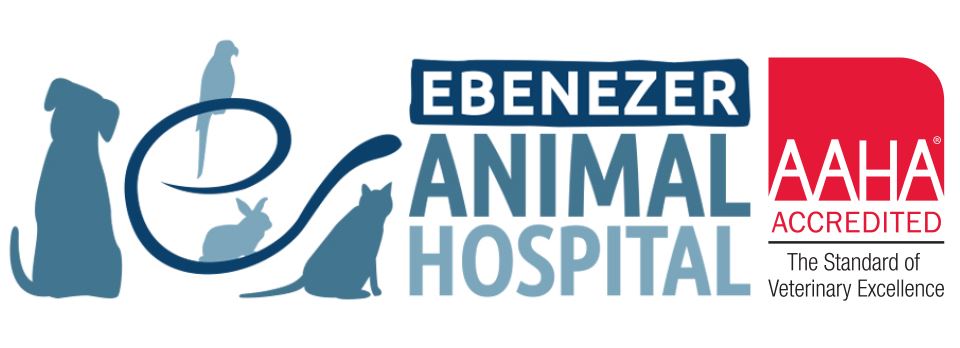Scheduled surgeries are performed Monday through Friday at Ebenezer Animal Hospital. Surgeries are commonly recommended when your pet’s yearly examination reveals medical problems correctable by surgery and in other situations that may require immediate attention. Our team of doctors at Ebenezer Animal Hospital are highly trained for many of the routine surgeries your dog or cat may need. They include:
Types of Surgeries Performed
- Sterilization surgeries: Sterilizations are the most common procedures at Ebenezer Animal Hospital. These include neutering for males (castration) and spaying for females (an ovariohysterectomy).
- Stomach tacking: This is a protective surgery performed on large, deep-chested dogs (i.e. Great Danes) that lowers the incidence of stomach bloat. This is commonly performed at the time of a spay or neuter.
- Mass removal surgeries: These include cancerous masses (tumors of the skin or mouth), warts, and skin tags.
- Wound repair: Your pet may have injuries including lacerations, abscesses, or punctures. We are skilled in repairing all of these.
- Abdominal surgery: These include advanced procedures such as bladder stone removal, removal of a foreign object from the stomach or intestinal tract, organ removal (i.e. spleen, uterus), biopsy of internal organs (liver, spleen, intestine, etc.), and emergency reproductive surgeries (cesarean section).
- Eye surgery: Common procedures include eyelid mass removal, cherry eye correction (prolapse of the gland of the third eyelid), enucleation (removal of the eye), entropion surgery (removing excessive skin around the eye which causes the eyelids to roll inward), and removal of abnormal hair growth on the eyelid.
- Orthopedic Surgery: Ebenezer Animal Hospital is proud to offer the services of Charlotte Veterinary Surgical Services for owners who wish to have an option other than a specialty clinic to perform major orthopedic surgery . These include, but are not limited to, cranial cruciate ligament rupture (the equivalent of tearing an ACL), fracture repair, and much more. Surgeries performed by Charlotte Veterinary Surgical Services are performed at Ebenezer Animal Hospital in Rock Hill, SC, with staff you know and trust!
- Laser therapy: In some instances, we may recommend laser therapy before or after a surgery to promote blood flow, alleviate pain, reduce swelling, and speed healing.
What is the Surgery Process Like?
Your pet is admitted in the morning after being fasted the night before (water is fine). We then run pre-anesthetic blood work, which checks white and red blood cells and internal organ chemistry values such as kidney, liver, total protein, and electrolytes, to ensure that your pet is a good candidate for surgery.
Following the blood tests, we administer a light sedative to your pet to help them relax prior to the procedure. Then, the doctor administers anesthetic drugs that are carefully selected based on your pet’s body weight, species, age, and breed. An endotracheal tube is placed into your pet’s trachea (or wind pipe) to allow him or her to breathe gas anesthesia carried by oxygen. This keeps them asleep during the entire procedure. During this entire process, your pet is monitored by a highly trained veterinary technician and monitoring equipment that assesses your pet’s heart rate, blood oxygen level, blood pressure, and body temperature.
Pets Above the Age of Eight
For pets above the age of eight, we insert an intravenous catheter. A catheter allows your older pet to receive intravenous fluids during the procedure, which maintains adequate hydration, increases blood flow to vital internal organs, helps maintain body temperature, and generally results in a faster and smoother recovery.
While asleep, your pet lies on a heated surgical table to keep them warm during the procedure. Pain control is VERY important to our doctors! We typically use up to three forms of pain control during a surgery to ensure your pet is as comfortable as possible when he or she wakes up. These include local anesthetics, anti-inflammatories, and powerful pain control drugs. Pain control continues after your pet goes home! We will always dispense pain control for several days following any surgical procedure. Post-operative antibiotics are dispensed for your pet if deemed appropriate by your doctor.
What to Expect After Surgery
After the surgery, we remove your pet from gas anesthesia and a technician sits with your pet until he or she wakes up on soft, comfortable bedding. We continue to monitor your pet’s vital signs throughout the morning and afternoon to make sure their recovery is smooth and uneventful. We will always call you shortly after your pet is awake, and your veterinarian will talk to you about the surgical procedure and how your pet did under anesthesia when you come in the afternoon or evening to pick him or her up. Your veterinarian also will explain any special instructions about your pet’s after-care. We also encourage you to ask questions!
Schedule an Appointment
If you are considering veterinary surgery for your pet, please contact us at (803) 366-1950 to schedule a consultation with your Ebenezer Animal Hospital veterinarian.
Explore Our Complete List of Veterinary Services in Rock Hill, SC
What's Next
Call us or schedule an appointment online!
Meet with a doctor for an initial exam.
Put a plan together for your pet.

